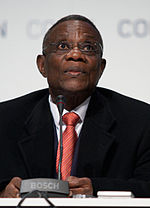User:Dennis moot/sandbox

Dennis Moot 12:51, 10 March 2011 (UTC)The National Media Commission (NMC) established by Act of Parliament as stated in the 1992 Constitution of Ghana, article 166 clause (1), performs a supervisory role over all media establishment in the country. The constitution then again in article 167, clearly states its functions. Despite the Commission’s effort to maintain sanity in the media landscape in Ghana, there are several criticisms that, it is nothing but a ‘toothless bull dog’. This write up will point out unavoidable circumstances by which these criticisms is said to be true.
First and foremost, article 162 clause (3), sates that ‘there shall be no impediments to the establishment of private press or media; and in particular, there shall be no law requiring any person to obtain a license as a prerequisite to the establishment or operation of a news paper, journal or other media for mass communication or information’, yet PNDC Law 211 contains a licensing system that provides license to interested persons who wish to operate a news paper. Not only that, individuals who wish to setup a radio/television station needs some form of licensing from the Ghana Telecommunication Authority under the Ministry of Information to obtain a frequency for its operation. This has produced a dependency where media houses feel they are not accountable to the Commission. This assumption even though logic has made the media house to grow horns and bully their way through anytime there is a dispute. The NMC has no backing of the law to freeze any media house license or order its closure when they go wrong in their delivery of its duties. In the nutshell, the media houses show the flex and sometimes refuse to attend to the call of the NMC when an issue is at stake.
Secondly, there are no rules empowering the commission to take punitive action against the commission. There are times where the media houses in Ghana go off guard infringing and stepping on other people’s rights and most importantly reducing the standard of journalism but yet the NMC keeps silence on the matter. Not because of their ineffectiveness as a commission but their power is being ‘shoot in the foot’ by the Constitution. As one of their function is to ‘take all appropriate measures to ensure the establishment and maintenance of the highest journalistic standards in the mass media, including the settlement of complaints made against or by the press or other mass media’; The fact still remains that any punitive measures taken by the Commission that may result in the seizure of license or closure will tantamount to censorship and a clear contradiction of article 162 clause (2) which states ‘subject to this Constitution and any other law not inconsistence with this Constitution, there shall be no censorship in Ghana’. Aside this, the Constitution does not provide provisions that will enable the Commission compel journalist who err in the delivery of their duties.
There has been countless times where journalists have been summoned by the security agencies for reporting one thing or the other. In most cases the NMC remains silent and does nothing to protect and make sure that journalist as well as media houses are free to express themselves. A recent occurrence where Ato Kwamena a reporter/presenter for Joy Fm made certain pronouncement concerning government actions and was being invited and held by the BNI. The NMC kept quiet about the matter and left the matter to the media house and the journalist to sort themselves out. It took the effort of the radio station to wield support until the said journalist was released. Even though the primary and first duty of the commission is to ‘ promote and ensure the freedom and independence of the media for mass communication or information’ the commission barely act with the constitutional provision and refuse to challenge quarters that acts in a way that results in the suppressing the freedom and independence of the media.
Most of the inactiveness of the commission happens to be as a result of constitutional provision that invariably reduces the extent to which the NMC can operate in its functions. The first step to ensure the Commission operates effectively is to change the inconsistencies in the constitution and empowering the commission exercise it duties without fear or favor. Inconsistencies such as registered in article 162 clause 3 which makes it clear not form of registration is needed for the establishment of a media entity and article 167 subsection (d) which gives the commission the power to make regulations for the registration of newspapers and other publication should be cross checked. Which the idea of accountability, the commission should be allowed to handle the registration of not only newspapers but also electronic media and the allocation of a frequency in other to make media entities accountable to the commission and put them on their toes to observe the ethics, laws and regulations governing the media landscape.
Aside that, additional provisions that will empower the NMC to summon any journalist or media house for not operating in the highest journalistic standard should be added to make journalists and media entities accountable to the Commission. This will ensure that the function of the NMC to ensure the establishment and maintenance of the highest journalistic standards in the mass media will be released. It is only when these flaws are checked that the NMC will function fully and be seen as a ‘bull with teeth’.
